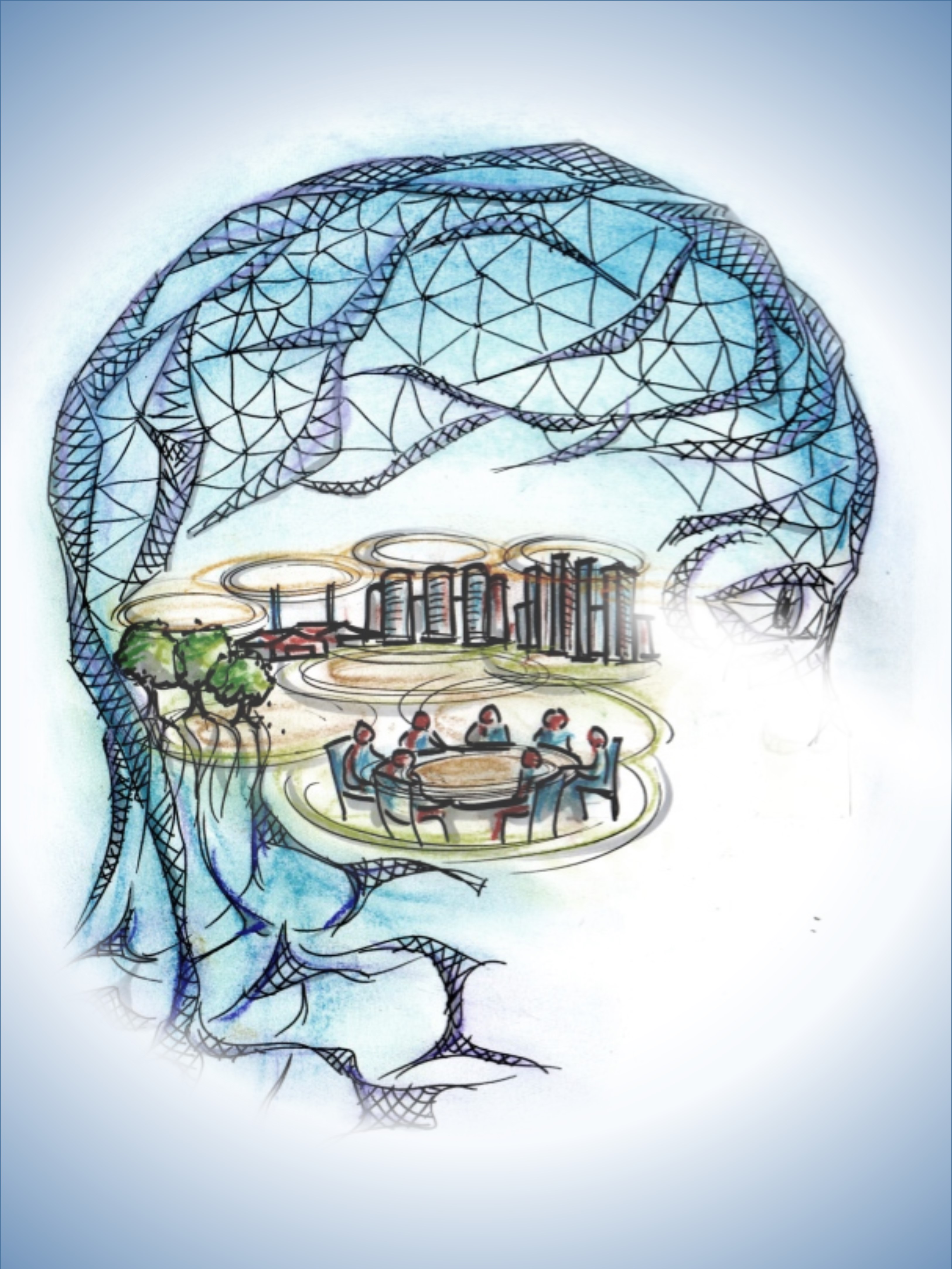Foresight 3.0
methods, tools and applications for the ‘collective forward intelligence’
Special issue in Foresight – the journal of future studies and strategic thinking.
Welcome to the Foresight 3.0 Forum
Welcome to the launch – 13th April 2023 1300 BST – register here
In this turbulent 21st century the scope of foresight has come to address existential ‘grand challenges’, such as climate change, mass extinction, digital surveillance and post-truth fragmentation. The scope of possible transformation is also moving rapidly, with new paradigms for governance, economic systems, and knowledge co-production among others.
This is an opportunity for the practice and theory of ‘looking ahead’, to move towards a next generation ‘Foresight 3.0’ – ‘from transition to transformation’. This is a foresight process based on a ‘collective forward intelligence’: the mutual learning, co-innovation and co-production, between a wider stakeholder community, with deeper layers of value & meaning, and further horizons of transformation. This is a twin track agenda –
- – internally, for the ‘collective forward intelligence’ within the foresight team and program (the ‘means’):
- – externally, for the foresight users and society around, where the ‘collective forward intelligence’ is the key to the transformations ahead (‘the ends’).
In this spirit we invite contributions from practitioners and analysts for the ‘Foresight 3.0’ special issue of Foresight – the journal of future studies and strategic thinking. Each paper should be based on (a) practical methods and tools, and/or (b), fundamental concepts in the Foresight 3.0 approach. . Each paper may cover applications from the ‘STEEP’ range (social, technological, economic, environmental, political, cultural, or urban/territorial). For example, there are topical new agendas where a Foresight-3.0 type approach can be an enabler of decolonization processes (Karuri-Sebina, Miller & Feukeu 2022): new concepts of civic society influencing the human agenda (Chaudhary, Tariq, Iftikhar & Khurshid 2022…): new forms of social innovation (Amanatidou and Gritzas, 2020; Amanatidou, et al. 2018): or low-carbon transitions (Ravetz et al 2020).
Essential features for each paper include one or more of the following
- – Practical applications, methods and tools based on the Foresight 3.0 approach and the ‘collective forward intelligence’
- – Fundamental concepts in the Foresight 3.0 approach and the ‘collective forward intelligence’;
Papers may then explore these ideas in a wide range of applications:
- Social: health & pandemics, place-making, social innovation:
- Technology: smart / AI systems, circular economies;
- Environmental: climate adaptation, net-zero transitions, risk & resilience, eco-innovation ;
- Economic: collaborative / transformative business models, financial systems, economic paradigms:
- Policy: collaborative / transformative governance, road-mapping, participation, conflict resolution;
- Cultural: post-truth, decolonization, emancipation, spiritual development;
- Urban & territorial: city /region foresight, visioning & transformation.
Overall, this special issue aims to demonstrate and put on the map new propositions and applications of Foresight 3.0 thinking: to advance the theory and analysis of ‘collective anticipatory intelligence’: and to set out new directions for research and practice. If projects on decolonization or social innovation around the world can gain insight and validation, and translate their visions into practice, then the Foresight 3.0 agenda will run and run.
TIMING
- Call is now open –
- Submission of abstracts: please send by 1st May to joe.ravetz@manchester.ac.uk
- Editorial decision on abstracts: 1st June
- Full text submissions: 1st October
- Review process complete: 1st January 2024
- Final paper versions: 1st March
- Publication: 1st May 2024
Abstracts should be 2-400 words, with notes as far as possible on – (a) practical applications & results and/or (b) theory / methodology / innovations / insights.
LINKS
Foresight 3.0 launch event – 13th April 1300 GMT – for authors & the wider community of freethinkers, reviewers, co-creators. We will present the Foresight 3.0 concept with applications, examples etc – register here
Welcome to the Foresight 3.0 Forum – we invite informal updates, comments, blogs, links, cartoons & other outputs from the Mind-Lab Fore-wise program, along with research papers in the special issue – mobilizing the ‘collective forward intelligence’ community…
Updates / events & other info on the Fore-wise theme
Journal page for submissions & details – www.emeraldgrouppublishing.com/calls-for-papers/foresight-30-theory-and-practice-exploring-collective-anticipatory-intelligence (dates to be revised to the above)
Special Issue Co-editors:
- Joe Ravetz, Leader Future Cities, Manchester Urban Institute, UK
- Geci Karuri-Sebina, Associate Professor, University of Witwatersrand School of Governance, South Africa
- Puruesh Chaudhary, Founder President, Agahi Foundation, Pakistan
- Effie Amanatidou, Hon. Senior Research Fellow, University of Manchester, Institute of Innovation Research
SOURCES:
Amanatidou, E., Gagliardi, D., Cox, D., 2018. Social Engagement: towards a typology of social innovation. Manchester Institute of Innovation Research Working Paper Series No. 82. DOI: 10.13140/RG.2.2.28787.84002 https://www.researchgate.net/publication/323809176_Social_engagement_Towards_a_typology_of_social_innovation_MIOIR_MBS_Working_Paper_Series-Working_Paper_82
Amanatidou, E., Gritzas G., (2020) Innovation for social needs in De Saille, S., Medvecky, F., van Oudheusden, M., Albertson, K., Amanatidou, E., Birabi, T., Pansera M. ‘Responsibility beyond Growth: A Case for Responsible Stagnation’. Bristol University Press. ISBN 978-1529208177
Chaudhary P, Tariq, Iftikhar & Khurshiid (2022) Is the Technological Singularity Scenario Possible: Can AI Parallel and Surpass All Human Mental Capabilities https://www.tandfonline.com/doi/abs/10.1080/02604027.2022.2050879…
Karuri-Sebina, G, Miller, R, & Feukeu, E, (Forthcoming, 2023). … Reconceptualising Foresight and its Impact: Experiences in Decolonising Futures from the global South, Special Issue, foresight journal, Emerald: https://www.emeraldgrouppublishing.com/journal/fs/upcoming-2023-special-issue-re-conceptualising-foresight-and-its-impact-experiences
Kevin Albertson, Stevienna de Saille, Poonam Pandey, Effie Amanatidou, Keren Naa Abeka Arthur, Michiel Van Oudheusden & Fabien Medvecky (2021) “An RRI for the present moment: relational and ‘well-up’ innovation”, Journal of Responsible Innovation, DOI: 10.1080/23299460.2021.1961066
Ravetz, J, & Miles, I.D, (2016) Foresight in cities: on the possibility of a “strategic urban intelligence”, Foresight, Vol.18(5), pp469-490, http://dx.doi.org/10.1108/FS-06-2015-0037

